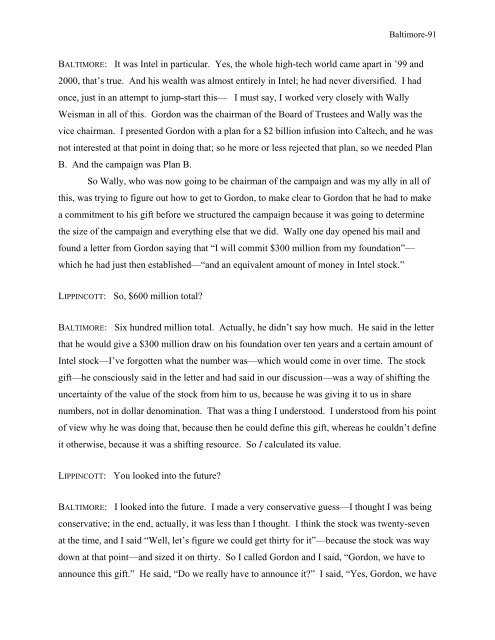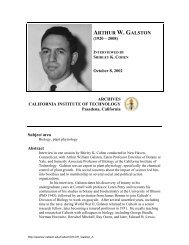Interview with David Baltimore - Caltech Oral Histories
Interview with David Baltimore - Caltech Oral Histories
Interview with David Baltimore - Caltech Oral Histories
You also want an ePaper? Increase the reach of your titles
YUMPU automatically turns print PDFs into web optimized ePapers that Google loves.
<strong>Baltimore</strong>-91<br />
BALTIMORE: It was Intel in particular. Yes, the whole high-tech world came apart in ’99 and<br />
2000, that’s true. And his wealth was almost entirely in Intel; he had never diversified. I had<br />
once, just in an attempt to jump-start this— I must say, I worked very closely <strong>with</strong> Wally<br />
Weisman in all of this. Gordon was the chairman of the Board of Trustees and Wally was the<br />
vice chairman. I presented Gordon <strong>with</strong> a plan for a $2 billion infusion into <strong>Caltech</strong>, and he was<br />
not interested at that point in doing that; so he more or less rejected that plan, so we needed Plan<br />
B. And the campaign was Plan B.<br />
So Wally, who was now going to be chairman of the campaign and was my ally in all of<br />
this, was trying to figure out how to get to Gordon, to make clear to Gordon that he had to make<br />
a commitment to his gift before we structured the campaign because it was going to determine<br />
the size of the campaign and everything else that we did. Wally one day opened his mail and<br />
found a letter from Gordon saying that “I will commit $300 million from my foundation”—<br />
which he had just then established—“and an equivalent amount of money in Intel stock.”<br />
LIPPINCOTT: So, $600 million total<br />
BALTIMORE: Six hundred million total. Actually, he didn’t say how much. He said in the letter<br />
that he would give a $300 million draw on his foundation over ten years and a certain amount of<br />
Intel stock—I’ve forgotten what the number was—which would come in over time. The stock<br />
gift—he consciously said in the letter and had said in our discussion—was a way of shifting the<br />
uncertainty of the value of the stock from him to us, because he was giving it to us in share<br />
numbers, not in dollar denomination. That was a thing I understood. I understood from his point<br />
of view why he was doing that, because then he could define this gift, whereas he couldn’t define<br />
it otherwise, because it was a shifting resource. So I calculated its value.<br />
LIPPINCOTT: You looked into the future<br />
BALTIMORE: I looked into the future. I made a very conservative guess—I thought I was being<br />
conservative; in the end, actually, it was less than I thought. I think the stock was twenty-seven<br />
at the time, and I said “Well, let’s figure we could get thirty for it”—because the stock was way<br />
down at that point—and sized it on thirty. So I called Gordon and I said, “Gordon, we have to<br />
announce this gift.” He said, “Do we really have to announce it” I said, “Yes, Gordon, we have

















